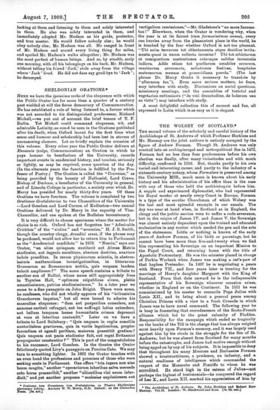SHELDONIAN ORATIONS.*
HERE we have the ipsissima verba of the eloquence with which the Public Orator has for more than a quarter of a century past wielded at will the fierce democracy of Commemoration. He has established a rule of being listened to, a favour which was not accorded to his distinguished predecessor, Richard Michell,—we put out of account the brief tenure of T. F. Dallin. Yet Michell could command eloquence, wit, and admirable Latinity, as could be seen in the Orations published after his death, when Oxford learnt for the first time what sense and humour and scholarship had been lost in storms of unreasoning clamour. Let us briefly explain the occasion of this volume. Every other year the Public Orator delivers at Encaenia (vulgo, Commemoration) an Oration in which he pays honour to benefactors of the University, records important events in academical history, and touches, seriously or lightly, as may be required, some question of the day. (In the alternate years the function is fulfilled by the Pro- fessor of Poetry.) The Oration is called the "Creweian," as being provided by the bounty of Nathaniel, Lord Crewe, Bishop of Durham, a benefactor of the University in general, and of Lincoln College in particular, a society over which Dr. Merry has presided for nearly thirty-five years. Of these Orations we have fourteen. The volume is completed by two Orationes Gratulatoriae to two Chancellors of the University —Lord Goschen and Lord Curzon of Kedleston—two annual Orations delivered by Dr. Merry in the capacity of Vice- Chancellor, and one spoken at the Bodleian tercentenary.
It is very difficult to choose specimens where the matter for choice is so rich. Oxford has not forgotten her "Admirable Crichton" of the " sixties " and "seventies," H. J. S. Smith, though the country clergy, Arcadici senes, if the phrase may be pardoned, would not allow her to return him to Parliament as the "Academical candidate" in 1878. " Nescio," says our Orator, "an aline quisquam exstiterit aut Alma Matris studiosior, aut ingenio excultiore, uberiore doctrina, suaviore indole praeditus. In rerum physicarum scientia, in abstrus- issimis mathematicae investigationibus, in litterarum Graecarum ac Romanarmn notitia, quis nnquam laudem tulerit ampliorem ?" The same speech contains a tribute to another son of Balliol, whose name still appropriately lives in Toynbee Hall, " optimum reipublicae civem, plebis amantissimum, pa.triae studiosissimum." In a later year we come to a fine panegyric on John Bright. There were some, be confesses, who did not wholly approve of his " tribunicios Gmcchorum impetus," but all were bound to admire his masculine eloquence: " dum aut pauperibus consulere, aut annonae caritati refrag,ari, aut lus suffragii latius extendere, ant bellum tanquain laesae humanitatis crimen deprecari et voce et lateribus contendit." Later on we have a tribute to Lord Salisbury : " Quis unquam in regiis conciliis auctoritatem graviorem, quis in variis legationibus, propter facundiam et agendi peritiam, maiorem praestitit gratiam ? Quis unquam aut pacis studiosior fuit, aut regni Britannici propugnator constantior ? " This is part of the congratulation to his successor, Lord Gosehen. In the theatre the Orator felicitously quoted Livy's panegyric on Porcius Cato. We may turn to something lighter. In 1892 the Orator touches with an even hand the professions and promises of those who were seeking seats in Parliament. One offers " tria iugera non sine bourn mugitu," another " operariorum laboribus salvo, mercede octo horas praescribit," another "aitientibus vini nsum inter- dieit," and yet another proposes " ecclesiae expilationem aut • Orations* twit Creweianse tam Gratulatoriae in Theatro Sheldoninsto plerusnque habitue. Auctore W. W. Merry, D.D. Oxford: at the Clarandou Press. [6a: not.] vectigalium remissiones,"—Mr. Gladstone's "no more Income. tax !" Elsewhere, when the Orator is wondering why, when the year is at its fairest (cum formosissimus annus), every one hurries away from the pleasantest place in the world, he is touched by the fear whether Oxford is not too pleasant. "Ubi enim terrarum tot oblectameuta atque desidiae invita- menta quasi in unum collects invenias ? Ubi tot athletarum et remigantium contentiones ceteraque calidae iuventutis ludicra. Adde etiam tot puellarum amabiles occursne, musicorum acroamata, saltationes festivas, bospitales matronarnin mensas et ponieridiana pocula." (The last phrase Dr. Merry thinks it necessary to translate by "afternoon tea "). Even more serious matters, he fears, may interfere with study. Discussions on social questions, missionary meetings, and the assemblies of teetotal and vegetarian enthusiasts (" de vini desuetudine, de holerum usu ac victu ") may interfere with study.
A most delightful collection this of earnest and fun, all expressed in Latin which is as easy as it is elegant.






































 Previous page
Previous page